Brexit Groundhog Day
London -- As AFP’s reporter in the House of Commons, I have had a front seat in covering Brexit from day one. It has often been a surreal affair. Take a day a couple of months ago.
I was standing with a group of other journalists outside a House of Commons committee room, where MPs had gathered to discuss their latest attempt to unseat Prime Minister Theresa May.
The rumour on this particular day was that Jacob Rees-Mogg, the aristocratic leader of the most hardline Brexit supporters in May’s Conservative party, had written a letter of no confidence in her leadership. If he could persuade enough MPs to do the same, May could be forced out within days.
"Have you written your letter, Jacob?" one of my colleagues asked. "Scribble, scribble, Mr Gibbon," he replied as he walked inside, to the familiar banging of tables and shouts of "hear hear"!
We exchanged exasperated sighs. Rees-Mogg is known for his eccentric language -- for several years he held the record for the longest word ever uttered in parliament, floccinaucinihilipilification (the action or habit of estimating something as worthless, in case you were wondering) -- but normally we had some idea of what he was talking about.
A bit of Googling revealed this to have been a quote from a duke to an 18th-century historian, the aforementioned Mr Gibbon, who wrote a lot. A valid comment on Westminster's often over-enthusiastic press corps, perhaps. But it didn't answer our question -- was this the beginning of the end for May and her Brexit plan?
A minister walked past and stopped to complain about the plotting by his own party colleagues. "It's like a bloody alternative government," he grumbled.
Soon after, Rees-Mogg emerged to confirm he had written his letter, and descended an ornate staircase to hold an impromptu press conference on the steps of parliament. It felt like it could be a major turning point in this long, complex saga.
But then a protester stepped up and started shouting "Stop Brexit!" at him through a loud-hailer, drowning out his historic speech. It was hard not to laugh.
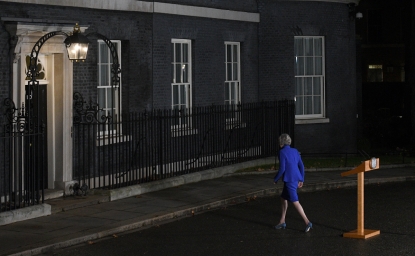 Britain's Prime Minister Theresa May leaves the lecturn after delivering a statement to members of the media in Downing Street in London on January 16, 2019, after surviving a vote of no confidence in her government. (AFP / Oli Scarff)
Britain's Prime Minister Theresa May leaves the lecturn after delivering a statement to members of the media in Downing Street in London on January 16, 2019, after surviving a vote of no confidence in her government. (AFP / Oli Scarff)Brexit is a huge story with serious implications for Britain, encompassing economics, politics, social issues and foreign affairs. As AFP's reporter in the House of Commons, where the decisions are made on how this will all unfold, I find it fascinating. But as a Brit, watching the political chaos all around me can also be deeply unnerving. So you have to keep a sense of humour.
My job is to follow the government's plans and those of various groups of MPs who have their own ideas about Brexit. First, of course, there's the prime minister. May is not good at idle chat. She gamely invites us all to Downing Street twice a year for drinks, but it is often an exercise in excruciatingly awkward small talk.
Her public statements, meanwhile, are dominated with the kind of repetitive phrases -- Brexit means Brexit, take back control -- that have earned her the nickname Maybot.
Occasionally, though, she lets her guard down. At a recent press conference, she asked the journalist in front of her, George Parker of the Financial Times, to ask his question. But it wasn't George, it was someone else. Next up, she found another journalist she thought was George. But it wasn't him either. By the time she had mistaken a third journalist in a row for George Parker, she began giggling.
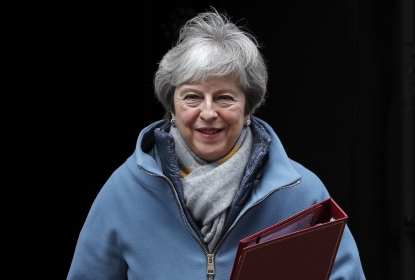 British Prime Minister Theresa May leaves 1o Downing Street to make a statement to the House of Commons in London on January 21, 2019, on changes to her Brexit withdrawal agreement. (AFP / Adrian Dennis)
British Prime Minister Theresa May leaves 1o Downing Street to make a statement to the House of Commons in London on January 21, 2019, on changes to her Brexit withdrawal agreement. (AFP / Adrian Dennis)Official news also comes in the form of daily briefings from Downing Street. In a drafty turret room in the Commons, we quiz May's spokesman on everything from detailed policy questions to her weekend plans. Asking a question that's not about Brexit always draws a cheer. But it's rare. There is some sport to be had in seeking confirmation or otherwise of the latest feverish speculation about what could happen if Britain leaves the EU without a deal. One such gem was a report that officials were planning to relocate the royal family if there were riots in London. “It’s simply not true, you’ll be amazed to hear,” the spokesman said, his voice dripping with sarcasm.
Then there are the Commons debates. Sometimes, there is a speech to make the heart soar. And many MPs are doing their best navigating their way through what often seems like an impossible situation. But often, despite its gothic glory, the chamber resembles a school playground with MPs braying and shouting at each other across the green leather benches.
Watching from the press gallery above the Speaker's chair, I always take a seat where I can see the ruling Conservatives. They routinely heckle each other, wave papers in the air and point their fingers. The opposition aren't much better, but the Tories do it as the prime minister sits in front of them, trying to keep a straight face. The Speaker, meanwhile, sits on his ornate chair shouting at them all to stop shouting. Occasionally things get out of hand -- one MP grabbed the ceremonial mace in a rage, and was swiftly ejected.
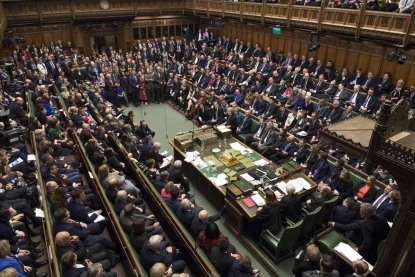 A handout photograph released by the UK Parliament shows Britain's Prime Minister Theresa May making a statement in the House of Commons in London on January 15, 2019 directly after MPs rejected the government's Brexit deal. (AFP / Mark Duffy/UK Parliament)
A handout photograph released by the UK Parliament shows Britain's Prime Minister Theresa May making a statement in the House of Commons in London on January 15, 2019 directly after MPs rejected the government's Brexit deal. (AFP / Mark Duffy/UK Parliament)Sometimes, the noise is so loud that I worry it will bring the whole place down. And of course, there is a small risk that it might. Parliament is awaiting a major renovation project and until then, the authorities are patching it up as they go along. Men in hi-vis vests interrupt our briefings on their way to the roof. Behind my desk under Big Ben, in a warren of rooms occupied by the press, a torrent of water runs down the wall into a dirty bucket every time it rains. I plugged in a heater last winter and fused the whole room. Still, we have an excellent view over Parliament Square.
I share an office with journalists from a pro-Brexit newspaper and anti-Brexit newspaper. Perhaps surprisingly to outsiders, the "lobby", as the Westminster press pack is known, is a very friendly place. Most journalists are not ideologues. They're after a good story, some drama, intrigue and colourful personalities -- which the Brexit process has in spades. Plus, good relations across the divide help you keep on track of what is happening in the different camps. Although, to be honest, most of the chat is about the dodgy wifi and who has forgotten to return their coffee mugs to the cafeteria, which has now run out.
Gossip fuels this place. And, of course, Twitter. Everybody in Westminster tweets. Even the Foreign Office cat has its own account. Much of the time, of course, people just retweet each other, creating the perfect digital echo chamber. And news spreads fast. During one Commons debate, opposition Labour leader Jeremy Corbyn was caught on live television appearing to mouth the words “stupid woman” at the prime minister. The clip quickly went viral, and was picked up by Tory MPs sitting in the chamber. A row broke out, ending up in the extraordinary sight of MPs clustered around the Speaker’s chair demanding he watch the footage. Corbyn denied the remark.
There are many moments to distract you from the serious business of Brexit. But gradually, things move forward. After months of tortuous negotiations with the EU, in November, we finally had a Brexit agreement. Whatever you thought of it, after all the false starts, scraps of news and speculation, ministerial resignations that briefly looked like they could bring down the government, it was actual progress. We all returned to Brussels with the prime minister for a Sunday morning summit in December to seal the deal.
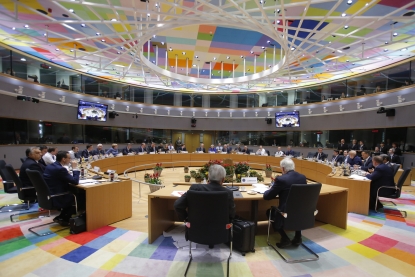 A general view of UE leaders with Britain's Prime Minister Theresa May (background) during a special meeting of the European Council to endorse the draft Brexit withdrawal agreement and to approve the draft political declaration on future EU-UK relations on November 25, 2018 in Brussels. (AFP / Olivier Hoslet)
A general view of UE leaders with Britain's Prime Minister Theresa May (background) during a special meeting of the European Council to endorse the draft Brexit withdrawal agreement and to approve the draft political declaration on future EU-UK relations on November 25, 2018 in Brussels. (AFP / Olivier Hoslet)Except that back home, it was immediately clear that MPs hated it. And on January 15 they rejected it. Not just by a bit. But by a margin so large that it set a new record for a British government defeat. Normally, a leader in May's position would resign. But these are not normal times. She challenged the opposition to call a confidence vote, which she won. Just like she had won the challenge launched by Rees-Mogg. An exhausting 24 hours, and we were back where we started. Still no Brexit plan.
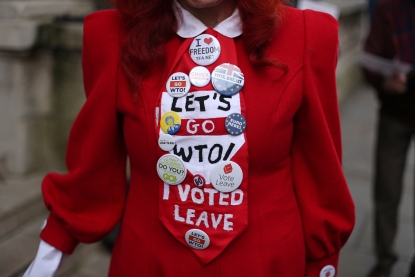 A pro-Brexit protester wearing I Voted Leave and other slogans on her tie poses for a photograph in London on January 23, 2019. (AFP / Daniel Leal-olivas)
A pro-Brexit protester wearing I Voted Leave and other slogans on her tie poses for a photograph in London on January 23, 2019. (AFP / Daniel Leal-olivas)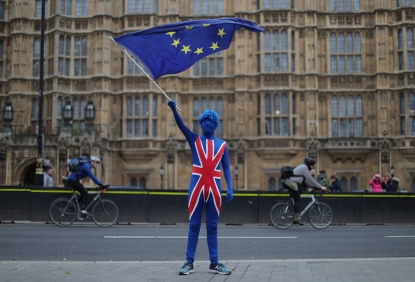 A anti-Brexit demonstrator dressed in a Union Flag suit and waving an EU flag stands on the road outside the Houses of Parliament in central London on March 29, 2018. (AFP / Daniel Leal-olivas)
A anti-Brexit demonstrator dressed in a Union Flag suit and waving an EU flag stands on the road outside the Houses of Parliament in central London on March 29, 2018. (AFP / Daniel Leal-olivas)
"What's happening?" my family and friends text me at regular intervals. "I'm stockpiling loo paper," messaged one during a particularly chaotic few days last month. The more dramatic among them follow up with a lament: "We're all doomed."
On a personal level, the uncertainty about our future is unnerving. The ignorance that remains about how the EU works is frustrating. And the divisions -- it's not just politicians, but right down to my own social circle. Taxi drivers. At the school gate. Even my local newsagent has a view. I try to avoid it on my days off. Of course, I have my own ideas about what should happen. I'm left screaming at the television as much as anyone else. But my job is to help people understand what is happening, not to rant about it. There are enough people doing that.
Explaining it all is not easy, particularly with all the jargon. Is it a soft Brexit, a hard Brexit, WTO terms, or Norway-plus we’re after? And there’s the parliamentary tactics by MPs to force the government to change course. The Malthouse Compromise, the Grieve Amendment, the Cooper-Boles plan -- as colleagues have observed, it’s like a list of bad thrillers. Which makes no sense to most ordinary people.
When it feels like we're going around in circles, I head outside. Opposite parliament, next to a small village of broadcast tents, a crowd of protesters gathers daily. Their numbers ebb and flow depending on the day's drama.
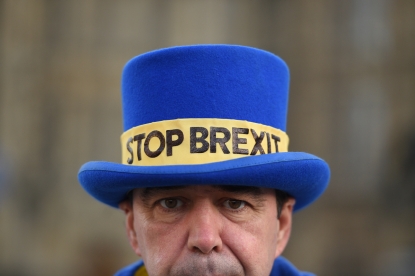 Anti-Brexit campaigner Steve Bray poses near the temporary broadcast news studios at College Green outside the Houses of Parliament in central London on December 11, 2018. (AFP / Oli Scarff)
Anti-Brexit campaigner Steve Bray poses near the temporary broadcast news studios at College Green outside the Houses of Parliament in central London on December 11, 2018. (AFP / Oli Scarff)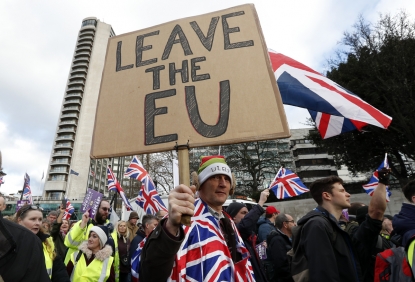 Protesters hold up placards and Union flags as they attend a pro-Brexit demonstration promoted by UKIP (United Kingdom Independence Party) in central London on December 9, 2018, as the crucial vote on the Brexit deal in the House of Commons looms. (AFP / Adrian Dennis)
Protesters hold up placards and Union flags as they attend a pro-Brexit demonstration promoted by UKIP (United Kingdom Independence Party) in central London on December 9, 2018, as the crucial vote on the Brexit deal in the House of Commons looms. (AFP / Adrian Dennis)
I chat to those who think the whole thing is madness and want it stopped. And then to the Brexit supporters who, reflecting the views of many voters across the country, cannot understand why it is all taking so long. "Why can't we just leave?" they ask.
Back inside, I try again to make sense of it all. But if I can't, there's always tomorrow. Because the latest talk is that Brexit won't actually happen on March 29.
That the government will delay. Or call an election. All possible. There’s even a suggestion that Queen Elizabeth II might step in. Highly unlikely. But who knows?
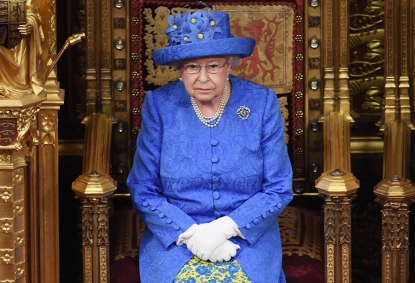 Britain's Queen Elizabeth II attends the State Opening of Parliament, June 21, 2017. (AFP /pool/ Carl Court)
Britain's Queen Elizabeth II attends the State Opening of Parliament, June 21, 2017. (AFP /pool/ Carl Court)


